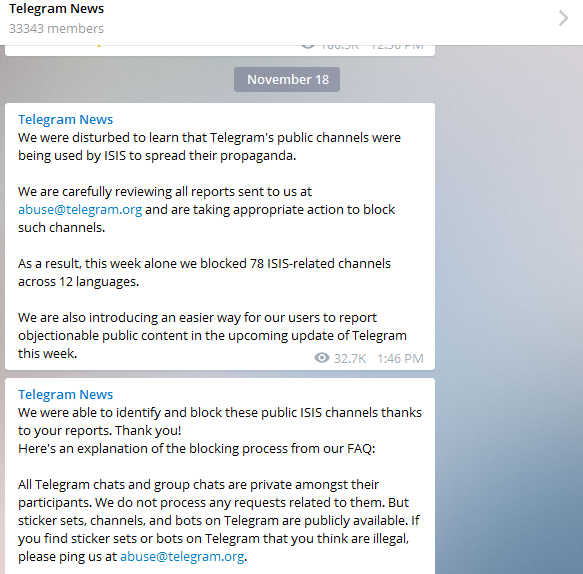
In the wake of revelations that groups affiliated with the Islamic State were using the Telegram messaging service to communicate and spread propaganda materials, the nonprofit organization running the service announced that it had moved to block terror-related content from being spread through its servers.
"We were disturbed to learn that Telegram's public channels were being used by ISIS to spread their propaganda," a Telegram spokesperson posted in the service's Telegram News channel. "We are carefully reviewing all reports sent to us at abuse@telegram.org and are taking appropriate action to block such channels. As a result, this week alone we blocked 78 ISIS-related channels across 12 languages." The channels were identified and blocked in part because of abuse reports filed by Telegram users.
Channels allow Telegram users to subscribe to broadcast content published through a permanent URL and allow the channel publisher to reach an unlimited number of users. While the channels are connected to a specific profile by the service, the user can post content—including files, images, and messages—anonymously from a mobile device or PC.
Telegram can block public content on its network under its abuse policy, including channels, which the service introduced in September, as well as "sticker set" images and automated "bot" message applications developed by third parties. When abuse complaints are filed against public content, Telegram's support team checks their content, in part because of the contractual requirements that come with offering the Telegram Messenger application through Google's and Apple's app stores. While Telegram will pull content that is illegal in various countries, such as pornography, the Telegram spokesperson said:
Please note that this does not apply to local restrictions on freedom of speech. For example, if criticizing the government is illegal in a country, Telegram won‘t be a part of such politically motivated censorship. This goes against our founders’ principles. While we do block terrorist (e.g. ISIS-related) bots and channels, we will not block anybody who peacefully expresses alternative opinions."
However, there is little Telegram can do about blocking communications that happen in private groups within the service's network, which can include up to 200 users. "All Telegram chats and group chats are private amongst their participants," Telegram's spokesperson wrote. "We do not process any requests related to them." So while they may no longer be able to publish links for new followers to access propaganda materials, bomb-making instructions, and other data, ISIS members can still pass information to contacts securely over the service.
reader comments
41